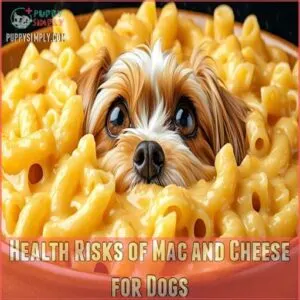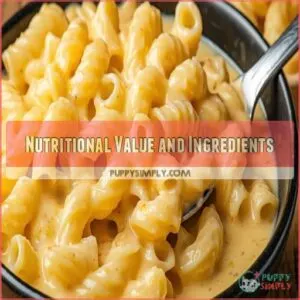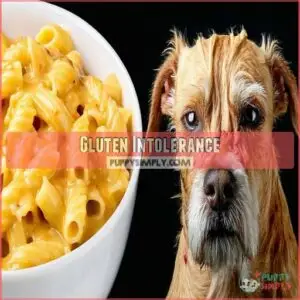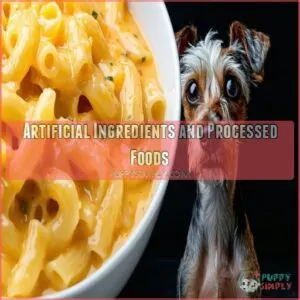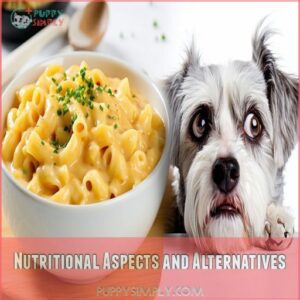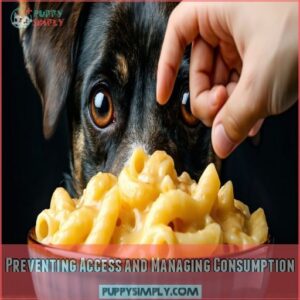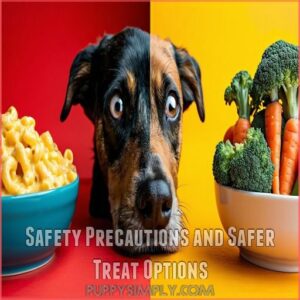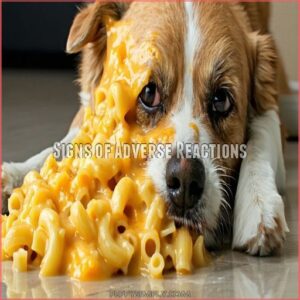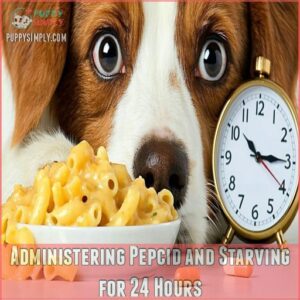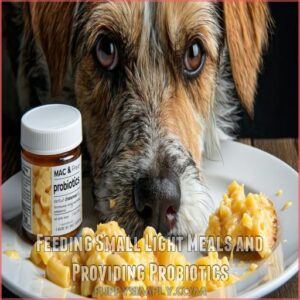This site is supported by our readers. We may earn a commission, at no cost to you, if you purchase through links.
 Wondering if you can dogs eat mac and cheese? Think twice before sharing that cheesy treat with your furry friend!
Wondering if you can dogs eat mac and cheese? Think twice before sharing that cheesy treat with your furry friend!
Mac and cheese can wreak havoc on your dog’s digestive system, causing painful issues like diarrhea, vomiting, and potential pancreatitis.
Dogs often struggle with lactose and gluten, making this comfort food a risky snack.
The high fat content and artificial ingredients can trigger allergic reactions, disrupt metabolism, and lead to obesity.
While those puppy eyes might be hard to resist, your pup’s health is more important than a momentary indulgence. Stick to dog-friendly alternatives that’ll keep your companion happy and healthy. Want to know what treats won’t send your dog to the vet?
Table Of Contents
- Key Takeaways
- Health Risks of Mac and Cheese for Dogs
- Can Dogs Safely Eat Mac and Cheese
- Nutritional Aspects and Alternatives
- Behavioral Considerations and Professional Recommendations
- Preventing Access and Managing Consumption
- Safety Precautions and Safer Treat Options
- When to Take Your Dog to The Vet for Mac and Cheese Consumption
- Frequently Asked Questions (FAQs)
- Can dogs eat macaroni and cheese?
- Can one eat mac and cheese powder?
- Can dogs eat apples instead of Mac and cheese?
- Can a diabetic dog eat macaroni and cheese?
- Is Mac and cheese bad for You?
- Can dogs eat Maraconi & cheese?
- Is mac and cheese ok for dogs?
- Can dogs eat pasta with cheese?
- Can dogs have cheese sauce?
- Can dogs have Velveeta?
- Conclusion
Key Takeaways
- Mac and cheese is harmful to dogs due to its high fat, sodium, and lactose content, causing digestive issues, allergies, and potential health problems like pancreatitis.
- Processed ingredients and artificial additives in mac and cheese lack essential nutrients and can disrupt your dog’s metabolism and overall well-being.
- Instead of mac and cheese, feed your dog healthier alternatives like carrots, sweet potatoes, or lean cooked meats, which are safe and nutritious.
- Always consult your veterinarian before introducing new foods to your dog’s diet to prevent health risks and ensure balanced nutrition.
Health Risks of Mac and Cheese for Dogs
If you’ve ever wondered whether your furry friend can safely enjoy mac and cheese, you’ll want to pay close attention to the potential health risks.
From digestive nightmares to hidden nutritional pitfalls, your dog’s well-being could be at stake with just a few bites of this cheesy temptation.
Digestive Issues
When mac and cheese meets your pup’s digestive system, trouble brews fast. Diarrhea, vomiting, and bloating can strike like lightning, turning your furry friend’s tummy into a war zone.
These digestive issues stem from high-fat content and difficult-to-digest ingredients, potentially triggering pancreatitis.
In addition, the trans fats found in some mac and cheese recipes, similar to those found in margarine, can increase the risk of heart disease and other health problems.
Watch for warning signs and keep that cheesy temptation far from your dog’s reach.
Nutritional Deficiencies
Mac and cheese rarely delivers the essential nutrients your pup craves.
This processed food lacks vital vitamins and minerals dogs need for healthy growth.
Your furry friend misses out on protein, calcium, and key micronutrients that support muscle growth, bone strength, and overall wellness. A balanced canine diet demands more strategic nutrition planning.
Allergic Reactions
Allergic alarm bells ring when Fido meets mac and cheese! Your furry friend might develop serious reactions that catch you off guard.
Watch for these telltale signs of dog food allergies:
- Intense itching and skin rashes
- Unexpected respiratory distress
- Digestive system upheaval
- Swelling around mouth or face
- Sudden energy crashes
Dairy, wheat, and artificial ingredients can trigger these mac and cheese dog allergy nightmares.
Choking Hazards
Noodle nightmares can turn deadly for dogs when mac and cheese becomes a choking hazard. The combination of pasta shapes and cheese texture spells potential danger, especially for smaller pups.
| Dog Size | Choking Risk |
|---|---|
| Small | High |
| Medium | Moderate |
| Large | Low |
Safe preparation and prevention strategies are vital to protect your furry friend from these sneaky mealtime dangers.
Phthalates Risk
Worried about what’s lurking in your dog’s favorite treat?
Phthalate sources in boxed mac and cheese can be a silent health hazard. These chemical compounds, often hiding in cheese powders, may trigger serious health effects.
Reducing exposure means ditching processed foods and choosing safe alternatives that keep your furry friend’s well-being front and center.
Can Dogs Safely Eat Mac and Cheese
You’ve wondered if mac and cheese is a safe treat for your furry friend, but the answer isn’t as simple as you might think.
While it might seem tempting to share your cheesy comfort food, mac and cheese can pose surprising health risks.
That every responsible dog owner should understand.
Nutritional Value and Ingredients
After uncovering potential health risks, let’s peek under the mac and cheese lid at its nutritional profile for your furry friend.
The dish packs a punch of sodium, fat, and carbohydrates that spell trouble for dog nutrition.
Artificial additives and processed ingredients rob your pup of essential nutrients, turning this comfort food into a potential health hazard for canine companions.
Dog nutrition is negatively impacted.
Lactose Intolerance
Most dogs struggle with lactose intolerance, making mac and cheese a risky snack.
Your furry friend’s digestive system can’t handle dairy’s complex sugars, triggering uncomfortable symptoms like bloating, gas, and diarrhea.
If you’re looking for dog-safe mac and cheese options, consider dog-safe mac and cheese alternatives.
Dairy alternatives and lactose-free cheese offer safer options.
Watch for digestive upset signs, and always consult your vet before introducing new foods that might upset your pup’s delicate stomach.
Gluten Intolerance
Wheat and gluten hide sneaky threats in mac and cheese for your furry friend. Dogs can develop serious gluten sensitivity that disrupts their digestive harmony.
A vegan dog diet may also pose risks, particularly regarding insufficient protein intake.
Watch for these warning signs:
- Persistent gas and bloating
- Chronic diarrhea or soft stools
- Skin rashes and persistent itching
- Sudden weight loss
- Reduced energy and lethargy
Gluten-free dog food might be your pup’s ticket to wellness, protecting them from potential allergic meltdowns.
Artificial Ingredients and Processed Foods
Hidden dangers lurk in those processed mac and cheese boxes that might tempt your furry friend.
Artificial ingredients in processed cheese can trigger sluggishness and disrupt your dog’s health, creating long-term complications you’d never anticipate.
Checking ingredient lists reveals potential risks: preservatives, synthetic colors, and mysterious additives spell trouble for your pup’s digestive system and overall well-being.
Nutritional Aspects and Alternatives
You might think mac and cheese is a harmless treat, but it’s nutritionally inadequate for your furry friend and could pose serious health risks.
Instead, you’ll want to explore balanced, nutrient-rich alternatives that can keep your dog healthy and satisfied without compromising their well-being.
Balanced Diet for Canine Health
If your mac and cheese habit has you wondering about your pup’s diet, it’s time to get real about balanced nutrition.
Dog food brands offer customized solutions that meet specific nutritional needs, considering dietary restrictions unique to each furry friend.
Your dog’s health depends on understanding their individual requirements, steering clear of one-size-fits-all feeding approaches.
Healthier Alternatives for Dogs
Countless dog owners seek healthier alternatives to mac and cheese that’ll keep their furry friends happy and thriving.
Let’s explore some dog-friendly treat options that pack a nutritional punch:
- Lean, cooked meats like chicken or turkey
- Fresh, low-sodium vegetables
- Plain, unseasoned fish
- Small portions of eggs
- Low-fat cottage cheese (in moderation)
These alternatives provide essential nutrients without the risks associated with processed human foods.
Cooked Sweet Potatoes and Zucchini
When you’re hunting for healthier mac and cheese alternatives, cooked sweet potatoes and zucchini emerge as nutritional powerhouses for your furry friend.
Sweet potatoes pack a punch of vitamins and fiber, while zucchini offers low-calorie hydration.
Chop and steam these veggies, serving small portions to introduce new dog-friendly recipes that support your pup’s wellness without digestive drama.
Gluten-Free Options
After exploring sweet potatoes and zucchini, gluten-free options offer a safer mac and cheese alternative for your furry friend.
Your dog’s health matters, so consider these smart choices:
- Protect your pup from painful allergic reactions
- Discover dog-friendly gluten-free pasta alternatives
- Create personalized recipes that keep tails wagging
Gluten-free mac and cheese recipes can help dogs with wheat sensitivities enjoy a tasty, safer treat without compromising their well-being.
Raw and Natural Foods
The raw food diet offers a natural alternative to processed meals for your furry friend.
By focusing on unprocessed, whole ingredients like lean meats, fresh vegetables, and organ meats, you can provide a nutrient-rich diet that mimics what dogs eat in the wild.
Before making the switch, consult your vet to verify balanced nutrition and minimize potential risks.
Behavioral Considerations and Professional Recommendations
You mightn’t realize how mac and cheese can impact your dog’s behavior and long-term health, potentially triggering obesity and food aggression.
Understanding professional recommendations and industry trends will help you make informed decisions about treating your furry friend and maintaining their ideal well-being.
Obesity and Behavioral Problems
Surprisingly often, mac and cheese can trigger weight gain and food aggression in dogs.
High-fat foods disrupt your pup’s metabolism, potentially leading to obesity and behavioral challenges.
Excess calories from mac and cheese strain exercise needs, causing sluggishness and potential mood changes.
Your dog’s health depends on maintaining a balanced diet that supports their natural energy and well-being.
Establishing Healthy Eating Habits
Battling obesity starts with smart treat training for your furry friend.
Healthy eating habits aren’t just about what you feed your dog, but how you do it.
Here’s your game plan for creating a balanced approach:
- Use tiny food rewards sparingly
- Practice portion control religiously
- Establish consistent meal timing
- Rotate dietary variety regularly
- Make training sessions short and fun
Your pup’s diet is a love language – speak it wisely.
Veterinary Advice on Mac and Cheese
In and around veterinary circles, mac and cheese sparks serious health concerns for dogs.
Experts unanimously caution against regular consumption, highlighting potential risks like pancreatitis and lactose intolerance.
Professional veterinarians recommend strict portion control, emphasizing the importance of balanced nutrition.
When in doubt, always consult your trusted vet for personalized guidance on safe dietary choices for your furry companion.
Pet Food Industry Trends
Given veterinarians’ cautious stance, the pet food industry is buzzing with innovation.
Growing demand for human-grade pet foods and novel protein sources is reshaping dog nutrition.
Subscription services and functional pet foods are trending, offering pet owners more sustainable, customized options.
As consumers become savvier about dog health, manufacturers are responding with carefully crafted, nutritionally balanced alternatives to traditional treats.
Preventing Access and Managing Consumption
In the case of mac and cheese, you’ll want to protect your furry friend from potential health hazards.
By implementing smart training techniques and careful food management, your proactive approach can help prevent accidental consumption.
Restricting access to human foods and closely monitoring their behavior will safeguard your dog’s safety.
Training Techniques for Dogs
Train your furry friend like a pro using positive reinforcement techniques that speak volumes.
Teach basic commands and leash manners with consistent, gentle guidance and tasty dog treats.
Housebreaking and crate training work wonders when you’re patient, rewarding good behavior instantly.
Your dog’s wellness depends on clear, loving communication that builds trust and prevents unwanted food-seeking behaviors.
Restricting Access to Human Food
Strategically restricting your dog’s access to human food involves more than just willpower.
Create physical and behavioral barriers to keep mac and cheese out of reach:
- Install baby gates in kitchen and dining areas
- Store human food in high, locked cabinets
- Teach clear "leave it" and "stay" commands
- Use secure, dog-proof containers for food storage
Proactive prevention beats constant supervision every time.
Monitoring for Symptoms
Your mac and cheese canine crisis radar needs sharp observation skills.
Watch for telltale signs your furry friend might be in digestive distress after eating this tempting treat.
Here’s a quick symptom tracking guide:
| Symptom | Mild Reaction | Serious Reaction |
|---|---|---|
| Vomiting | Occasional | Persistent/Bloody |
| Diarrhea | Soft stools | Watery/Bloody |
| Energy | Slight lethargy | Complete withdrawal |
Stay vigilant and trust your gut instinct about your pup’s health.
Contacting a Veterinarian
Occasionally, mac and cheese mishaps demand professional intervention. When your furry friend experiences concerning symptoms, reaching out to a veterinarian becomes vital.
Here are key steps for expert pet health guidance:
- Document exact symptoms, their timing, and duration to help your veterinarian diagnose the issue.
- Note onset and duration of symptoms
- Prepare your dog’s recent medical history
- Contact veterinarian immediately for personalized advice
Prompt communication makes a big difference in your pup’s safety and swift recovery.
Safety Precautions and Safer Treat Options
In the context of treating your furry friend, you’ll want to steer clear of mac and cheese and opt for safer, healthier alternatives that won’t compromise your dog’s well-being.
From nutritious carrots and watermelon to hearty options like broccoli and pumpkin, there are plenty of delicious treats that’ll keep your pup happy and healthy.
without the risks associated with processed foods.
Carrots and Watermelon as Treats
After keeping your pup away from mac and cheese, consider safer dog treat options like carrots and watermelon.
For a commercially prepared option, you can explore dog carrot treats as a convenient alternative.
These healthy alternatives pack a nutritional punch without digestive risks.
Carrots provide low-calorie crunch and dental benefits, while watermelon offers hydration and vitamins.
Always slice treats into small, bite-sized pieces and introduce them gradually to monitor your dog’s reaction.
Broccoli and Pumpkin as Alternatives
Nutrition powerhouses like broccoli and pumpkin can be game-changing dog-safe veggie treats.
Steamed broccoli offers vitamin-packed, low-calorie nutrition that supports your pup’s health, while pure pumpkin provides fiber and essential nutrients.
Broccoli also contains sulforaphane, a cancer-fighting agent, which can have numerous health benefits.
These healthy alternatives make awesome treat substitutions that’ll keep your furry friend satisfied without the risks of mac and cheese.
Avoiding Garlic and Onion Powder
Broccoli’s benefits aside, beware of garlic and onion powder lurking in mac and cheese.
These seemingly innocent seasonings can wreak havoc on your pup’s health, causing serious damage to red blood cells.
Always check ingredient labels and keep these dangerous spices far from your furry friend’s bowl. toxic nightmares for dogs
Better Options for Hearty Treats
Your pup deserves hearty treats that pack a nutritional punch.
When hunting for dog-friendly snacks, consider these healthy alternatives:
- Lean, cooked chicken chunks seasoned with no salt
- Homemade salmon treats rich in omega-3 fatty acids
- Dehydrated sweet potato strips for a crunchy, nutritious bite
These healthy dog treats offer meal ideas that support your furry friend’s wellness without risking digestive drama.
When to Take Your Dog to The Vet for Mac and Cheese Consumption
If your furry friend has gobbled up mac and cheese and starts showing signs of distress like persistent vomiting, diarrhea, or unusual lethargy,
it’s time to rush them to the vet.
Don’t wait or second-guess – professional medical attention can prevent potential complications and facilitate your pup’s quick recovery from this dairy-laden dietary mishap.
Signs of Adverse Reactions
After sharing safer treat tips, let’s spot warning signs when dogs eat mac and cheese.
Watch for vomiting, diarrhea, and sudden lethargy that screams something’s wrong. A rash or unexpected bloating could signal trouble brewing.
Dogs eating mac and cheese might experience rapid digestive distress or mild to severe reactions.
If your pup seems off after indulging, pay close attention – these symptoms demand immediate veterinary scrutiny.
If you suspect a dog mac cheese reaction, it’s vital to monitor your dog’s behavior closely and learn more about dog mac cheese reaction.
Administering Pepcid and Starving for 24 Hours
If your furry friend’s mac and cheese mishap turns serious, veterinarians might recommend Pepcid to manage digestive distress.
Carefully follow your vet’s prescribed Pepcid dosage, which varies by dog’s weight.
A 24-hour fast can help reset your dog’s digestive system, but always consult a professional first. This cautious approach helps prevent potential complications from mac and cheese toxicity, giving your pup’s system a chance to recover safely.
Feeding Small Light Meals and Providing Probiotics
When Pepcid starts to help, it’s time to ease your pup back into eating with gentle, probiotic-rich meals. Small portions of bland dog food can help restore gut health after mac and cheese mishaps.
- Start with quarter-sized meals every few hours
- Choose easily digestible proteins like boiled chicken
- Introduce dog-specific probiotics to support digestive recovery
Mild meals become your furry friend’s digestive lifeline, helping them bounce back from potential mac and cheese mayhem.
Frequently Asked Questions (FAQs)
Can dogs eat macaroni and cheese?
You shouldn’t feed your dog mac and cheese.
It’s packed with harmful fats, sodium, and lactose.
These ingredients can trigger digestive issues, allergic reactions, and potential long-term health problems.
Stick to dog-friendly treats for your pup’s well-being.
Can one eat mac and cheese powder?
Raw, powdery, tempting – mac and cheese packets pack hidden health risks.
Potential phthalate exposure, artificial additives, and contaminants make direct consumption unwise.
Always cook thoroughly and consume responsibly for safer enjoyment.
Can dogs eat apples instead of Mac and cheese?
Apples can be a safe, nutritious treat for dogs when served in moderation.
Remove seeds and core first, cut into small pieces.
Watch for any adverse reactions during initial feeding.
Can a diabetic dog eat macaroni and cheese?
Diabetic dogs shouldn’t eat mac and cheese, as it spikes blood sugar and contains unhealthy fats.
The high carbohydrate content can worsen insulin regulation.
potentially causing dangerous complications in your pet’s delicate health condition.
Is Mac and cheese bad for You?
Brace yourself for a cheesy revelation: mac and cheese might be a comfort food trap.
It’s loaded with calories, saturated fats, and sodium.
These can sabotage your health goals, potentially leading to weight gain and cardiovascular risks.
Can dogs eat Maraconi & cheese?
You’ll want to steer clear of mac and cheese for your furry friend.
High in fat, sodium, and lactose, it can trigger digestive issues, allergies, and potential long-term health problems.
that’ll have your pup feeling miserable.
Is mac and cheese ok for dogs?
No, mac and cheese isn’t safe for dogs.
It’s packed with harmful ingredients like high sodium, lactose, and fat.
These ingredients can trigger digestive issues, allergic reactions, and potentially lead to serious health complications.
Stick to dog-friendly treats.
Can dogs eat pasta with cheese?
Hold your horses before serving pasta with cheese to your furry friend!
Watch out for digestive nightmares, potential allergic reactions, and nutritional pitfalls.
Consult your vet first and stick to dog-friendly treats that won’t upset their tummy.
Can dogs have cheese sauce?
Cheese sauce can upset your dog’s stomach due to high fat and lactose content.
Veterinarians advise against it, as it may cause digestive issues, pancreatitis, and potential allergic reactions.
Opt for safer, dog-friendly treats instead.
Can dogs have Velveeta?
When Velveeta tempts your furry friend, think twice.
This processed cheese packs a punch of unhealthy fats, sodium, and potential allergens.
That could turn your pup’s tummy into a digestive danger zone, risking serious health complications.
Conclusion
Ultimately, your dog’s health trumps a cheesy temptation.
When considering mac and cheese, the risks far outweigh any momentary pleasure.
Whether you’re dealing with digestive issues, potential allergic reactions, or long-term health complications, steering clear of this human treat is a resounding no.
By choosing safe, nutritious alternatives like carrots or sweet potatoes, you’ll keep your furry friend healthy and happy.
Remember, can dogs eat mac and cheese? The answer is a resounding no.

